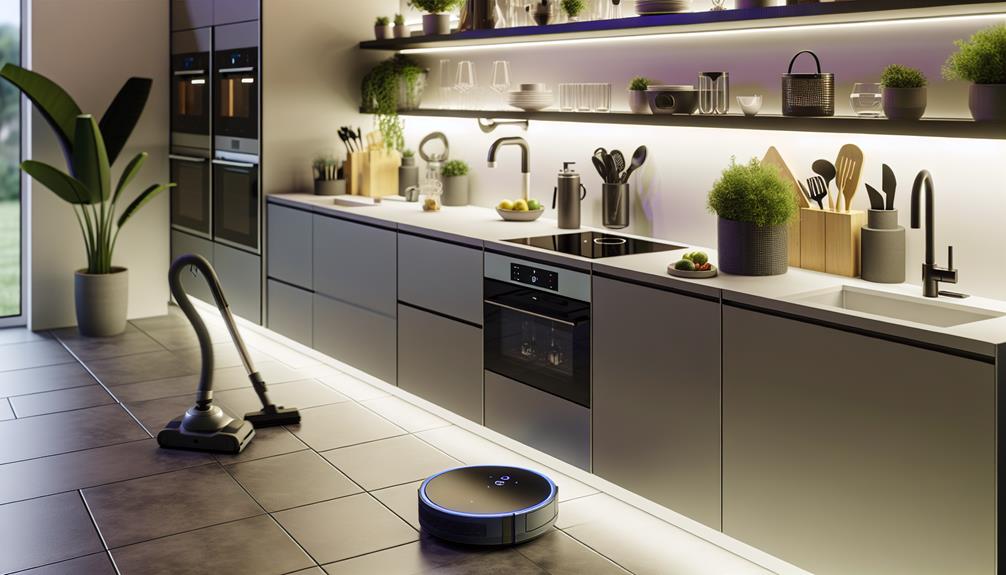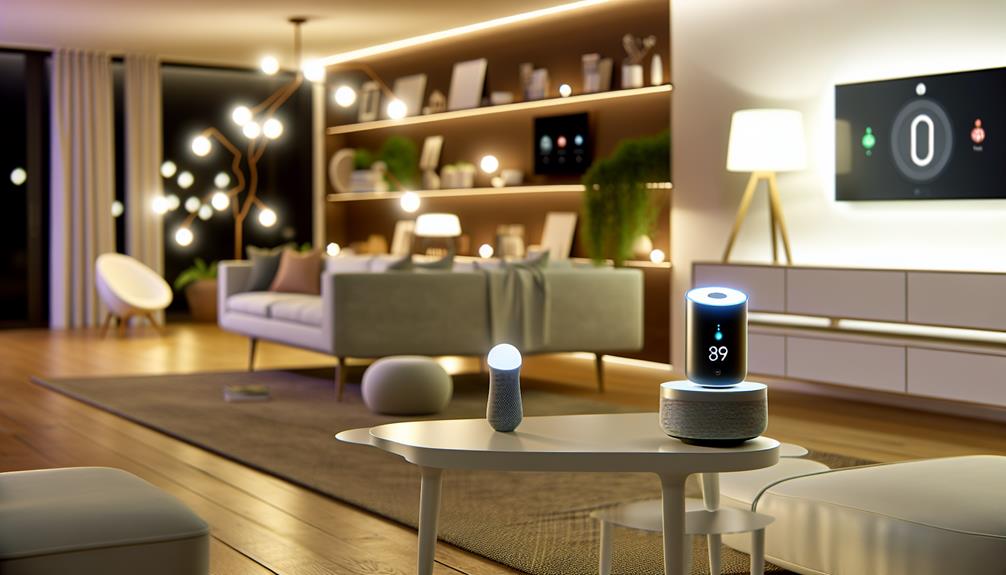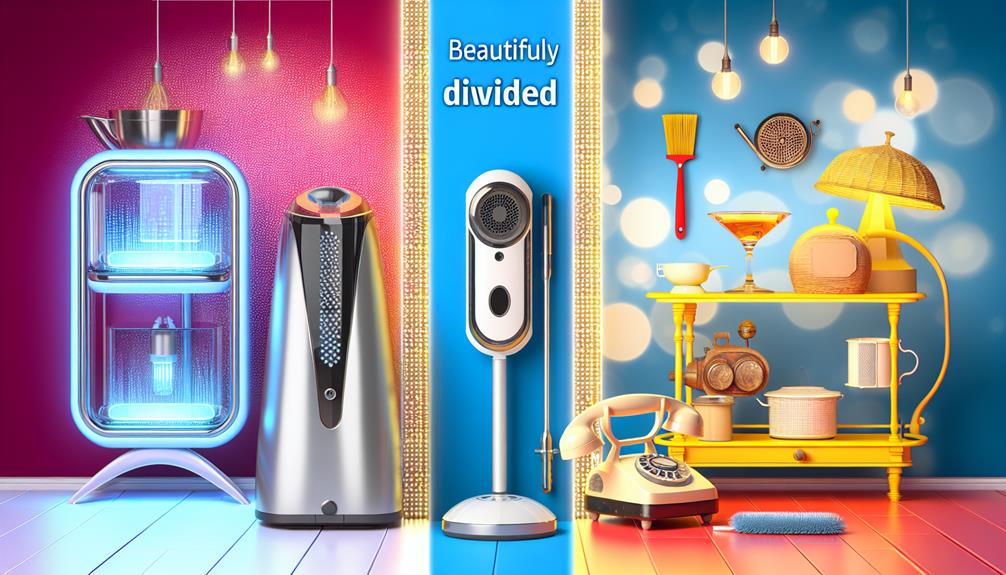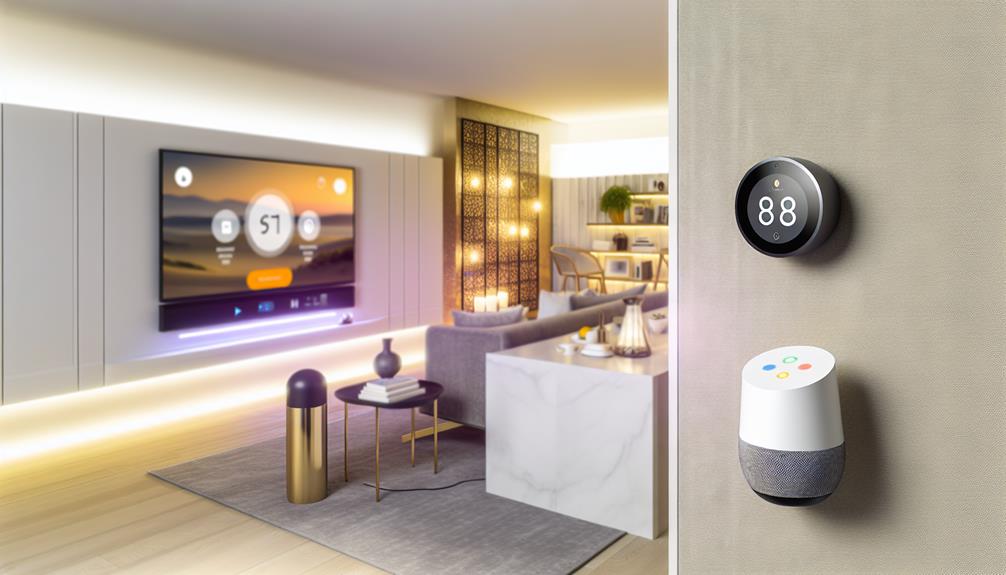Enhancing Daily Life With Innovative Home Gadgets
The integration of innovative home gadgets is reshaping the landscape of daily living, offering advancements that elevate convenience, security, and energy efficiency. With AI-driven technologies at the forefront, these devices not only respond to user preferences but also anticipate needs, creating a seamless living experience. However, as we explore the multifaceted benefits and capabilities of these smart home solutions, it becomes essential to contemplate their implications on our lifestyles and the environment. What lies ahead in this rapidly evolving domain may surprise you.
Key takeaways
- Smart home gadgets utilize AI to improve energy efficiency, reducing utility costs and environmental impact.
- Enhanced security systems offer real-time monitoring and alerts, providing peace of mind for homeowners.
- Voice activation and automation streamline daily tasks, fostering convenience and a responsive home environment.
- Energy monitoring tools track consumption patterns, enabling users to make informed decisions for sustainability.
- Personalized settings and adaptive learning create a unique experience tailored to individual preferences and lifestyles.
Understanding AI-Driven Technology
As technology continues to advance at an unprecedented pace, understanding AI-driven technology becomes essential for both consumers and industry professionals alike. Central to this evolution are AI algorithms and machine learning, which form the backbone of intelligent home gadgets. These sophisticated systems analyze vast amounts of data, enabling devices to learn from user interactions and adapt their functionality accordingly.
AI algorithms process information in real-time, allowing gadgets to make informed decisions that enhance user convenience. For instance, smart thermostats utilize machine learning to analyze patterns in temperature preferences, optimizing energy usage while maintaining comfort.
Similarly, AI-driven security systems can differentiate between familiar faces and potential intruders, providing a heightened sense of safety.
Moreover, the integration of AI technologies fosters a sense of community among users, as they share insights and experiences on optimizing their smart home devices. This collective knowledge not only enhances individual user experiences but also builds a robust network of informed consumers who can advocate for advancements in technology.
As we continue to embrace these innovations, a deeper understanding of AI-driven technology will empower us to harness its full potential in our daily lives.
Benefits of Smart Home Devices
Smart home devices offer significant benefits, primarily through enhanced energy efficiency and improved security systems.
By optimizing energy consumption, these technologies not only reduce utility costs but also contribute to environmental sustainability.
Additionally, advanced security features provide homeowners with peace of mind, ensuring their property is protected against potential threats.
Energy Efficiency Improvements
How can the integration of smart home devices greatly enhance energy efficiency within our living spaces? The advent of technology has revolutionized how we manage our energy consumption, creating an environment ripe for energy conservation.
Smart thermostats, for instance, allow homeowners to optimize heating and cooling schedules based on real-time occupancy data, greatly reducing energy waste. Coupled with energy audits, these devices help identify areas for improvement, such as insulation upgrades and LED lighting installations, ensuring homes are not only more comfortable but also more efficient.
Furthermore, eco-friendly appliances and solar panels serve as renewable sources that contribute to sustainable living. By incorporating power monitoring systems, residents can track usage patterns and identify opportunities for energy management.
The integration of these technologies fosters a sense of belonging to a community that values environmental responsibility. As we embrace these advancements, the cumulative effect of smaller, conscious choices leads to a substantial reduction in energy consumption.
Through effective implementation of smart home devices, we can collectively enhance energy efficiency, paving the way for a more sustainable future while enjoying the comforts of modern technology.
Enhanced Home Security Systems
While the primary goal of any home is to provide a safe haven, the integration of advanced smart home security systems elevates this fundamental need to new heights.
These systems incorporate smart surveillance technologies that enhance protection and promote peace of mind. With remote monitoring capabilities, homeowners can keep an eye on their property from anywhere in the world, allowing for real-time security notifications that alert them to potential threats.
Biometric access systems add an extra layer of security, guaranteeing that only authorized individuals can enter. Coupled with perimeter alarms and motion sensors, these devices create a thorough security network that deters intruders.
The cloud storage of surveillance footage not only secures valuable data but also facilitates easy access for review if necessary.
However, as with any technology, privacy concerns arise. It is vital for users to engage in robust user authentication practices to protect their personal information.
Should an emergency occur, seamless emergency response integration guarantees that help is only a button press away.
Key Features of AI Gadgets
AI gadgets are revolutionizing home automation through their key features, including seamless smart home integration, which enhances user convenience and control.
Voice activation capabilities further streamline interactions, allowing users to operate devices hands-free, thereby improving accessibility.
Additionally, energy efficiency solutions embedded in these gadgets contribute to sustainable living by optimizing energy consumption and reducing utility costs.
Smart Home Integration
Transforming everyday living, smart home integration has emerged as a defining feature of modern AI gadgets. This seamless connectivity allows households to operate in harmony, enhancing convenience and efficiency. Key components such as smart lighting and connected appliances empower users to personalize their environments through user-friendly interfaces.
The integration of automated assistants enables remote management of devices, making it easier to monitor energy consumption and optimize climate control. In addition, health monitoring systems offer insights into well-being, ensuring a holistic approach to daily life.
| Feature | Description |
|---|---|
| Smart Lighting | Adjust ambiance and save energy |
| Automated Assistants | Control devices through voice commands |
| Connected Appliances | Interconnected devices for efficiency |
| Health Monitoring | Track health metrics in real-time |
| Energy Monitoring | Analyze consumption patterns |
Personalized settings allow for individual preferences, fostering a sense of belonging in the home. As technology evolves, the potential for smart home integration continues to expand, making everyday tasks simpler and more intuitive. Ultimately, these innovations create a lifestyle that resonates with comfort and modern living.
Voice Activation Capabilities
Voice activation capabilities have revolutionized the way users interact with their home gadgets, providing a hands-free experience that enhances convenience and accessibility. By employing advanced voice recognition technology, smart assistants can respond to voice commands, allowing seamless control over various devices within a home automation ecosystem.
This hands-free control is particularly beneficial for individuals with mobility challenges, as it integrates robust accessibility features that foster independence and ease of use.
The use of natural language processing enables these smart assistants to understand and interpret user commands more intuitively, resulting in personalized responses that cater to individual needs. For instance, users can effortlessly adjust lighting, temperature, or even play music with simple vocal instructions, transforming their living spaces into responsive environments tailored to their preferences.
Additionally, device compatibility remains a critical factor in the effectiveness of voice activation. The ability to synchronize multiple gadgets guarantees that users can control an entire suite of devices with minimal effort.
Ultimately, the integration of voice activation not only enhances user convenience but also fosters a sense of belonging, allowing individuals to create a home atmosphere that resonates with their lifestyle.
Energy Efficiency Solutions
Sustainability has emerged as a paramount concern in modern technology, prompting the development of energy efficiency solutions within smart home gadgets. These innovations not only enhance daily life but also foster a community of eco-conscious individuals committed to sustainable practices.
Key features of these gadgets include solar panels, which harness renewable resources to power homes, and smart thermostats that optimize energy usage while maintaining comfort. Energy monitoring tools allow homeowners to track consumption patterns, empowering them to make informed decisions.
To illustrate the impact these technologies can have, consider the following table:
| Gadget Type | Benefits | Sustainability Impact |
|---|---|---|
| Solar Panels | Generate renewable energy | Reduces reliance on fossil fuels |
| Smart Thermostats | Optimize heating and cooling | Lowers energy consumption |
| Eco-Friendly Appliances | Minimize waste and energy use | Promotes a greener lifestyle |
Additionally, practices such as energy audits and effective home insulation complement these gadgets, providing a holistic approach to energy efficiency. Through smart lighting and power management, we can collectively contribute to a more sustainable future while nurturing our shared values.
Popular AI Home Innovations
Innovation in the domain of home technology has ushered in a new era of convenience and efficiency, particularly through the integration of artificial intelligence. Popular AI home innovations are redefining domestic experiences, making daily tasks more manageable and enjoyable.
For instance, AI gardening tools now assist homeowners in nurturing their green spaces with precision, ensuring ideal growth through real-time monitoring.
In the kitchen, smart kitchen appliances streamline meal preparation, offering features such as recipe suggestions and automatic cooking adjustments. Meanwhile, automated pet feeders provide pet owners peace of mind by ensuring their furry companions are fed on schedule, even during busy days.
Intelligent lighting systems enhance ambiance while conserving energy, adapting to user preferences and routines. Voice-controlled entertainment systems allow seamless access to music and media, fostering a sense of connection and engagement.
AI health monitors keep track of well-being, providing valuable insights for healthier living. Furthermore, smart thermostat innovations maximize home energy management, adjusting temperatures based on occupancy.
Robotic cleaning devices maintain cleanliness effortlessly, while interactive home assistants serve as central hubs for managing these technologies, enhancing overall home efficiency and comfort.
These innovations collectively create a more harmonious living environment, resonating with the modern homeowner's desire for simplicity and connection.
Integrating AI Into Daily Routines
The integration of artificial intelligence into daily routines is transforming the way individuals manage their time and tasks, enhancing productivity and personal well-being. AI personal assistants have emerged as key players in this evolution, providing seamless support for automated daily tasks. These systems leverage predictive home management to anticipate needs, enabling users to focus on what truly matters.
Smart appliance coordination, facilitated by intuitive user interfaces, allows for the synchronization of devices across the home, creating an ecosystem that responds to user preferences. For example, an AI system might adjust lighting and temperature based on contextual awareness features, ensuring a comfortable environment tailored to individual lifestyles.
Moreover, adaptive learning systems empower AI to personalize experiences over time, improving their recommendations and responses as they learn from user interactions. This lifestyle personalization fosters a sense of belonging, as individuals feel understood and catered to in their unique contexts.
As AI continues to integrate into everyday life, the potential for enhanced organization and efficiency grows, making daily routines not just easier, but more enjoyable. Embracing these innovations can lead to a more balanced, fulfilling lifestyle that aligns with personal aspirations.
Energy Efficiency With Smart Devices
Energy efficiency has become a pivotal concern in modern households, with smart devices offering significant advancements in this area. The integration of technology into our daily lives not only enhances convenience but also promotes sustainable living.
Smart devices, particularly smart thermostats and energy monitoring systems, empower homeowners to take control of their energy consumption, leading to reduced utility bills and a smaller carbon footprint.
Here are three key benefits of energy efficiency with smart devices:
- Smart Thermostats: These devices learn your heating and cooling preferences, automatically adjusting temperatures to reduce energy waste when you're away from home. This optimization can lead to substantial savings over time.
- Energy Monitoring: Smart energy monitors provide real-time feedback on energy usage, allowing homeowners to identify high-consumption appliances and make informed decisions about their usage patterns.
- Remote Control and Automation: Many smart devices offer remote access, enabling users to adjust settings from anywhere. This means you can turn off lights or HVAC systems while away, ensuring energy is not wasted.
Enhancing Home Security Solutions
As homeowners increasingly embrace smart technology for energy efficiency, the next logical step is to enhance home security solutions with similar advancements. Innovative products, such as smart locks and surveillance cameras, are revolutionizing the way we protect our homes. These devices not only provide robust access control but also integrate seamlessly with existing security systems, ensuring thorough coverage.
Modern alarm systems paired with motion sensors offer real-time security alerts, allowing homeowners to respond swiftly to potential threats. Additionally, remote monitoring capabilities enable users to keep an eye on their property from anywhere, fostering a sense of security and peace of mind.
By participating in a neighborhood watch program, homeowners can strengthen community ties while enhancing their collective safety. Privacy protection remains a critical concern, and advanced technology addresses this by offering encrypted data transmission and customizable settings for alerts.
In the event of an emergency, rapid emergency response can be initiated through these smart devices, ensuring that help is always just a click away. Embracing these innovative home security solutions not only safeguards property but also creates a more connected and secure living environment for all family members.
Customizing Your Smart Environment
When homeowners evaluate the potential of smart technology, customizing their smart environment becomes essential to maximizing functionality and comfort.
Tailoring a home's settings to reflect user preferences fosters a sense of belonging and enhances daily living. By integrating innovative gadgets, homeowners can create a space that adapts to their lifestyle.
Key elements to contemplate for customizing your smart environment include:
- Personalized Settings: Establishing unique configurations for each family member guarantees everyone feels at home, from temperature controls to entertainment systems.
- Adaptive Lighting: Implementing ambient adjustments through smart lighting allows homeowners to set the mood for any occasion, enhancing both productivity and relaxation.
- Automated Routines: Utilizing intuitive interfaces to create automated routines simplifies daily tasks, such as morning wake-up sequences or evening wind-down rituals, promoting efficiency and ease.
These features not only provide tailored experiences but also establish seamless connectivity among devices.
As smart technology evolves, the ability to customize one's living environment will continue to enhance comfort and functionality, creating a home that truly resonates with its inhabitants.
Future Trends in Home Automation
The evolution of smart technology is not merely about enhancing existing functionalities; it also opens the door to innovative trends that will shape the future of home automation. As we look ahead, smart appliances will become increasingly integrated, offering seamless connectivity that enhances user experience. Enabling remote monitoring, these devices will allow homeowners to manage their environments from anywhere, ensuring convenience and peace of mind.
User privacy concerns will drive the development of adaptive learning systems that prioritize data security while still offering personalized experiences. Voice recognition technology will evolve, facilitating intuitive interfaces that make interactions more natural and efficient. Automated lighting will adjust not only based on time but also on user habits, contributing to energy management efforts.
Furthermore, predictive maintenance will emerge as an essential feature, alerting homeowners to potential issues before they escalate, thereby improving the longevity of devices.
As these trends unfold, the future of home automation will not only enhance daily living but also create a sense of belonging within a community that values innovation, security, and sustainability. Embracing these advancements will redefine how we experience our homes, making them more intelligent and responsive to our needs.
Frequently Asked Questions
How Do I Choose the Right Smart Home Device for My Needs?
Choosing the right smart home device requires evaluating device compatibility with existing systems and appraising the user interface for ease of use. Prioritize features that align with your lifestyle to guarantee a seamless integration into your daily routine.
Can Smart Gadgets Work Without Wi-Fi or Internet Connectivity?
In a world increasingly tethered to connectivity, the allure of offline functionality in smart gadgets shines brightly. Many devices now offer wireless alternatives, enabling seamless operation without internet, ensuring convenience and enhancing user autonomy.
What Is the Average Lifespan of Smart Home Devices?
The average lifespan of smart home devices typically ranges from three to ten years. Factors influencing smart device longevity include build quality, usage patterns, software updates, and technological advancements, all greatly affecting overall performance and durability.
Are There Privacy Concerns With Using Ai-Driven Home Technology?
The integration of AI-driven home technology raises significant privacy concerns. Issues surrounding data security, voice recognition, user consent, and device vulnerabilities necessitate careful scrutiny to protect users' personal information and foster trust in these innovations.
How Much Do Innovative Home Gadgets Typically Cost to Maintain?
Innovative home gadgets typically incur maintenance costs that vary based on functionality and durability. However, investing in quality technology can lead to significant long-term savings, balancing initial expenses with reduced energy consumption and enhanced efficiency.



